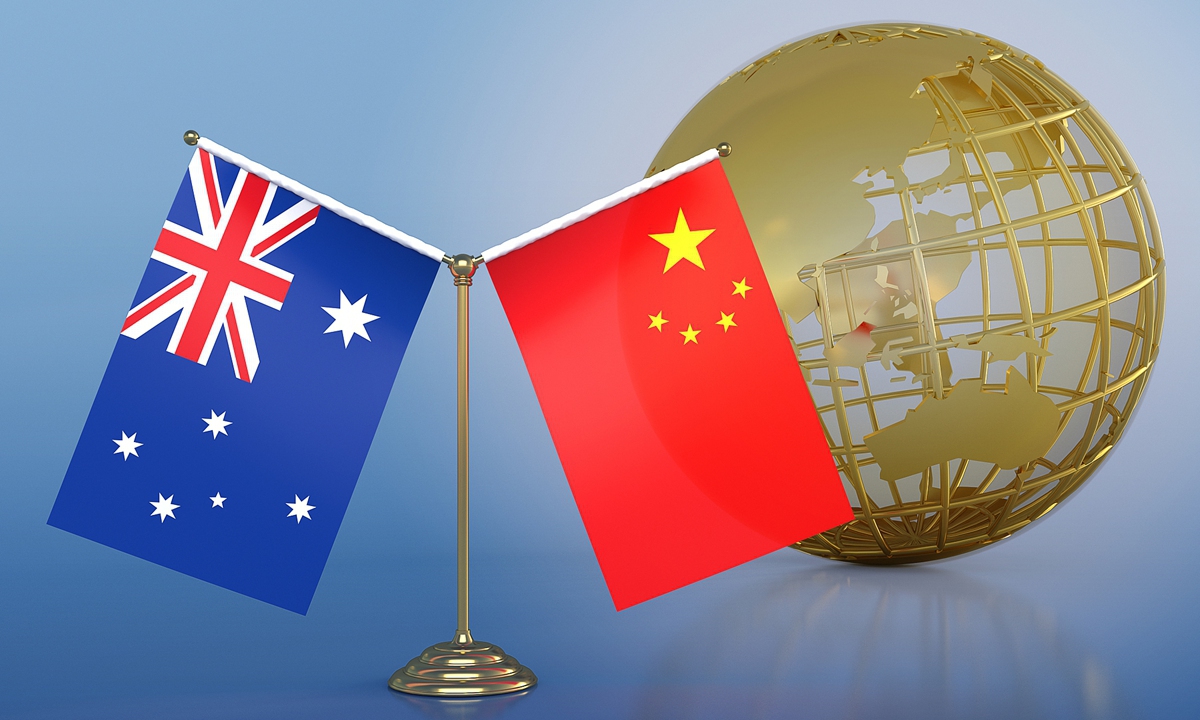
China Australia Photo: CFP
China-Australia trade delivered impressive results in 2023, as widely expected. The bilateral trade volume saw a 9.8 percent year-on-year growth, surpassing the pre-pandemic level in 2019, according to the latest trade data published by China's General Administration of Customs (GAC) on Friday.
This positive figure reflects the high complementarity of the two countries in economy and trade, along with the continuous improvement of bilateral relations throughout the year, marked by high-level interactions. The recovery of major Australian export goods, such as
barley, wool, and
coal fuelled the momentum for trade growth.
Experts said that bilateral trade in 2024 will sustain the strong trend, with more trading goods such as Australian wine and lobsters likely to return to the tables of Chinese consumers, under joint efforts.
Data that the GAC released on Friday show that the volume of China-Australia imports and exports reached 1.61 trillion yuan ($230 billion), a year-on-year increase of 9.8 percent, showing a strong momentum for the year.
Australian exports to China came to 1.091 trillion yuan, a growth of 15.3 percent year-on-year, sustaining the monthly double-digit growth rate since the beginning of 2023.
The trade volume last year surpassed the pre-pandemic level in 2019, which stood at $169.62 billion.
"The latest trade data are impressive; the economies of China and Australia complement each other, providing favorable conditions for steady economic cooperation," Chen Hong, director of the Australian Studies Center at East China Normal University, told the Global Times on Friday.
While the data demonstrated that mutual complementarity is the strength in the bilateral relationship, it also serves as an indication that robust cooperation is built on a foundation of mutual trust, Chen said.
The two countries have embarked on a trajectory of thawing relations since the meeting of the two countries' leaders in Bali, Indonesia in late 2022, which paved the way for improved ties, after they dropped to their lowest point in decades under the previous Morrison government.
Australian Prime Minister Anthony Albanese's official visit to China last November further solidified the improved ties.
Following the high-level meetings, market confidence in Australian goods was gradually restored, and the corresponding disputes were settled under joint efforts.
From the recovery of
coal shipping in February to
barley exports in October, along with traditional goods like iron ore, the country experienced "export springtime" last year, despite a weak economy and sluggish demand in many other parts of the world.
The resurgence of essential trading goods, crucial for Australia as a trade-dependent nation, with its major trading partner China, has also been a driver for the country's economic recovery.
Australia's rate of inflation has fallen to its lowest level in almost two years, official data recently published by the Australian Bureau of Statistics show, Xinhua News Agency reported.
"Recent Australian data show the country's economic recovery, affirming the positive bilateral relations and contributing to Australia's economic uplift and employment growth," Chen said.
Meanwhile, trade product categories are widening as both countries continue to work together to resolve corresponding disputes.
On November 30, China's Ministry of Commerce (
MOFCOM) said it will review anti-dumping and countervailing duties on wine from Australia, starting immediately, and will decide whether the punitive tariffs are necessary. The review should end before November 30, 2024, according to
MOFCOM.
An insider with a domestic wine industry association also confirmed with the Global Times on Friday that the bilateral talks on the wine dispute are currently underway.
Australia was previously the largest source of wine imports to China, and if the dispute is settled, it may soon overtake French wine in terms of market share, the insider said.
The Chinese expert believes that bilateral foreign trade will continue its strong momentum in 2024, "with major Australian export products like wine and lobsters expected to return to Chinese consumers' tables" as the two sides work on settling the dispute.
The upcoming Chinese New Year holidays and other domestic consumption holidays this year will further boost the sales of Australian products.
In addition to resolving past disputes in economic and trade cooperation, Chen said that both countries should also expand collaboration into areas such as clean energy and infrastructure to propel the economic ties forward.
Amid the thawing relations, Australian politicians need to recognize the importance of a stable China-Australia relationship for the economy, society, and culture before the next Australian federal election in 2025, Chinese experts said.
"Making anti-China sentiments a focal point is unwise, as stable relations benefit regional peace and development," Chen said.




